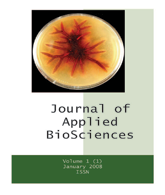Journal of Applied Biosciences (J. Appl. Biosci.) [ISSN 1997 - 5902]
Volume 12: 650 - 656. Published November 24, 2008.
Bio-preservative activities of Lactobacillus acidophilus U1during fermentation of fresh minced goat meat
Ogunbanwo ST. *^ and Okanlawon BM. **
*Department of Botany and Microbiology, Faculty of Science, University of Ibadan, P.O. Box 21422, Ibadan, Nigeria; **Department of Biomedical Sciences, Ladoke Akintola University of Technology, Ogbomoso, Nigeria.
^Corresponding author e–mail:[email protected].
ABSTRACT
Objective: To assess the effect of bacteriocinogenic Lactobacillus acidophilus U1 (LacU1) isolated from pygmy goat meat on food borne pathogens and spoilage microorganisms during the fermentation of minced goat meat.
Methodology and results: Bacteriocin obtained from LacU1 was purified and characterized. Survival of food spoilage and pathogenic bacteria artificially inoculated aseptically in fermenting minced goat meat was investigated. The bacteriocin showed inhibitory activity against both spoilage and pathogenic microorganisms with activity of 12800AU/ml against Enterococcus faecalis. Development of an off-odour was prevented in minced goat meat inoculated with isolate LacU1. In the fermenting goat meat, there was a sharp decrease in the population of inoculated pathogens within the first 48 h and a decrease to complete extinction at 72 h for Staphylococcus aureus and Escherichia coli, and 96 h for Listeria denitrificans and Enterococcus faecalis. The bacteriocin was heat stable at 60°C, with optimum activity of 12800(AU/ml) at pH 2 to 6. The activity was unstable or lost after treatment with proteolytic enzymes
Conclusions and application of findings: The use of bacteriocinogenic L. acidophilus U1 in meat as a starter culture can prevent proliferation of pathogenic and spoilage microorganisms which may cause deterioration when meat on sale is exposed to high temperature. This effect would extend the shelf life of meat products.
FULL PAPER [PDF AVAILABLE HERE]
